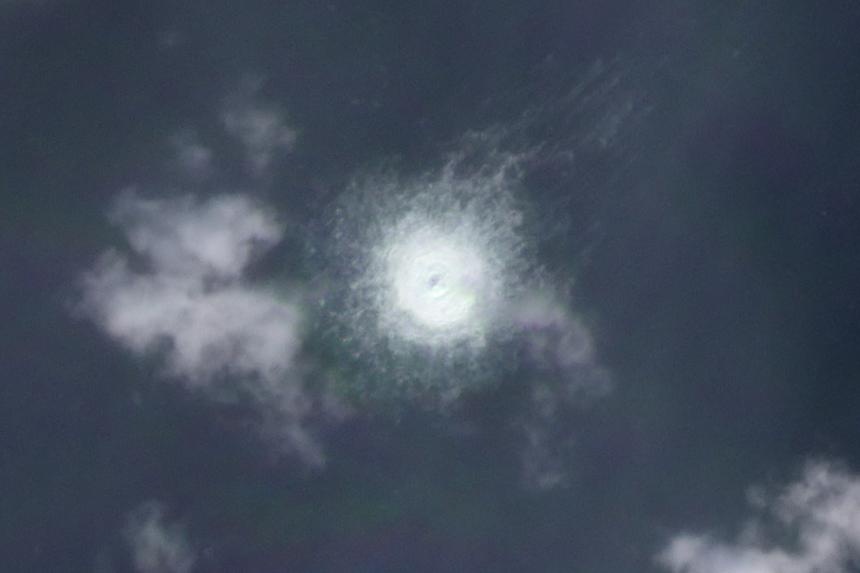BERLIN - Two days after a pair of explosions under the Baltic Sea apparently ruptured giant natural gas pipelines from Russia to Germany, the consensus hardened Wednesday that it had been an act of sabotage, as the European Union and several European governments labelled it an attack and demanded an investigation.
Experts said it could take months to assess and repair the damage to the Nord Stream 1 and 2 pipelines, which have been used as leverage in the West's confrontation with Moscow over Russia's invasion of Ukraine.
News of a possible attack on the lines heightened already intense fears of painful energy shortages in Europe over the winter.
But the central mystery remains: Who did it?
"All available information indicates those leaks are the result of a deliberate act," the EU's foreign policy chief Josep Borrell said in a statement Wednesday. "We will support any investigation aimed at getting full clarity on what happened and why."
Mr Jake Sullivan, US President Joe Biden's national security adviser, called the episode "apparent sabotage."
But with little evidence to go on - US officials said that explosive gas pouring from the broken pipes made it too dangerous to get close to the breach - the United States and most of its European allies stopped short of publicly naming any suspects. Still, some officials speculated about the many ways that Russia might gain, even though the pipeline carries its gas.
Poland and Ukraine openly blamed Russia, which pointed a finger at the United States, and Moscow and Washington issued indignant denials.
US officials and outside experts also speculated over whether Ukraine or one of the Baltic States, which have long opposed the pipelines, might have had an interest in seeing them disabled - and in sending a message.
As the war began, Germany blocked the just-completed Nord Stream 2 from going into service, and Russia later shut off the flow through Nord Stream 1, setting off a frantic effort in Europe to secure enough fuel to heat homes, generate electricity and power businesses.
Some European and US officials cautioned Wednesday that it would be premature to conclude that Russia was behind the apparent attacks on the Nord Streams, each of which is actually two pipelines.
President Vladimir Putin likes to show he has his finger on the gas valve, they noted, but wielding that power could mean keeping the pipelines, whose main owner is Russia's state-controlled energy company, Gazprom, in good working order.
But others noted that one of two Nord Stream 2 pipelines was undamaged, leaving Mr Putin the possibility of using it as leverage if the winter turns particularly cold.
Many Western officials and analysts said sabotage would fit neatly into Mr Putin's broader Russian strategy of waging war on multiple fronts, using economic and political tools, as well as arms, to undermine Ukraine's allies and weaken their resolve and unity.
It demonstrates to an already jittery Europe how vulnerable its vital infrastructure is, including other pipelines and undersea power and telecommunications cables.
"This is classic hybrid warfare," said Ms Marie-Agnes Strack-Zimmermann, head of the defence committee in Germany's Parliament, who stressed that for now she had no evidence Russia was behind the attack but believed it was the most "plausible" culprit.
"Putin is going to use every hybrid measure at his disposal to fluster Europeans, from food to refugees to energy," she said.
Kremlin spokesperson Dmitry Peskov said that accusing Russia was "predictably stupid and absurd." He said American natural gas suppliers were reaping "huge profits" from increased sales to Europe, suggesting that the United States was to blame.
"Of course we were not,'' Ms Adrienne Watson, the spokesperson for the White House's National Security Council, said in a rare on-the-record denial. "We all know Russia has a long history of spreading disinformation and is doing it again here."
The pipelines were damaged at a critical moment in the seven-month war. Kyiv is making unexpected advances in the battlefield, Moscow has challenged Ukraine's Western backers with thinly veiled threats of nuclear retaliation, Russia seems on the verge of annexing large parts of Ukraine, and Mr Putin's order to draft hundreds of thousands of men into the military is meeting broad resistance.
At first glance, it seems counterintuitive that the Kremlin would damage its own multibillion-dollar assets. But there is value for Moscow in fuelling European fear, which pushes up prices in the gas market.
And in the short term, analysts say, it is not clear what Mr Putin stands to lose, having already largely cut off gas deliveries to European countries in recent months.
On Wednesday, swirling streams of gas continued to escape the three ruptured pipes, roiling the sea surface near the Danish island of Bornholm. Danish authorities said they had begun a criminal investigation to determine the exact cause of the leaks. The US government offered its assistance.
While some European officials were quick to speculate about Russian involvement, US officials were more cautious, noting the lack of available evidence.
For all their harsh critiques of Mr Putin and his government, US officials noted that it had been tempting to blame just about every attack on Russia, sometimes wrongly. In July, there was a widespread assumption in Washington that a major cyberattack on Albania was a Russian effort to undermine a Nato ally; this month, officials said an investigation had concluded the culprit was Iran.
Several officials in Washington noted that non-governmental actors could have committed the pipeline sabotage. Others said the two detonations registered by seismometers in the region pointed to explosives placed by a submersible or dropped by aircraft or boat, suggesting a state had been involved.
"It's hard to assess; does anybody benefit?" Finnish President Sauli Niinistö told the news outlet Helsingin Sanomat. "That is why this is a mystery so far." NYTIMES

